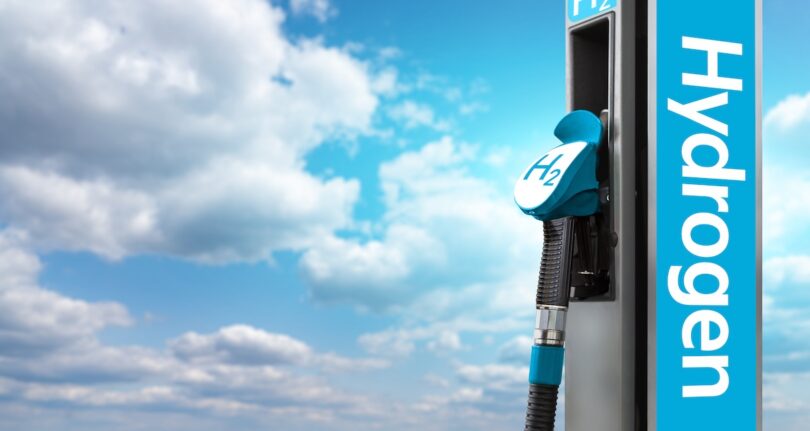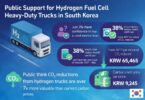In 2023, 37 new hydrogen stations opened in Europe, 12 in Japan, 29 in South Korea and 7 in North America. 92 per cent of the new European hydrogen refuelling stations can refuel heavy-duty vehicles. This is the result of the 16th annual assessment of H2stations.org, an information service of Ludwig-Bölkow-Systemtechnik (LBST). Meanwhile 40 countries have a hydrogen refuelling infrastructure in operation or under construction.

At the end of 2023, 921 hydrogen refuel-ling stations were in operation worldwide, another annual increase. This number includes 197 hydrogen refuelling locations in China. The actual number could be higher, but corresponding information sources have a significant degree of uncertainty. Concrete plans are already in place for 338 additional refuelling station locations worldwide outside of China. New additions to the list of countries with hydrogen refuelling infrastructure in operation or under construction are Brazil, Oman, and Namibia.
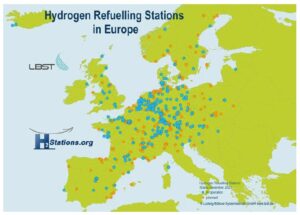
Europe had 265 hydrogen stations at year-end, 105 of which are in Germany. France is still second in Europe with 51 operating stations, followed by the Netherlands with 22, and Switzerland with 17 stations. While in 2019 about 70 per cent of the new refuelling stations were built just for passenger car refuelling, in 2023 this was the exception: 92 per cent of the 2023 inaugurated hydrogen refuelling stations are ready to refuel cars and heavy-duty vehicles like buses and trucks.
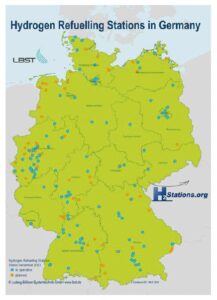
While in 2023, Germany unveiled only 8 completely new hydrogen refuelling stations, it has been upgrading 28 of the existing locations for heavy-duty vehicle refuelling. Meanwhile, nearly 40 per cent of the European hydrogen refuelling stations are suitable to refill cars and heavy-duty vehicles, compared to 27 per cent in 2019.
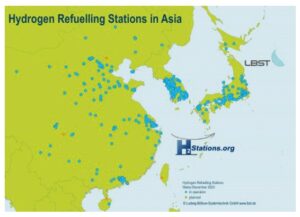
By the end of 2023, 166 hydrogen refuelling stations were operating in Japan. In South Korea vehicle refuel-ling is possible at 174 locations. The number of hydrogen stations in China is estimated at least at 197, the very challenging information access there limiting reliability. Furthermore, several refuelling stations that have already been built are not yet in operation, still awaiting regional operating permits. Outside of China, South Korea was again the leader with 29 commissions globally.
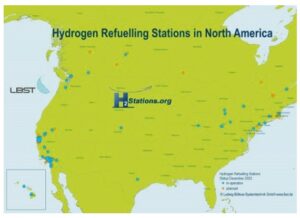
North America added 7 new filling stations last year which increases the number to 8 in Canada and 92 in the US, of which 75 are located in California.
Interactive location maps and individual evaluations
Using interactive maps, www.H2stations.org is the most comprehensive site for information globally on hydrogen refuelling stations, whether in operation, planned or already shut down, including a summary on recent changes. With its information on already closed stations, H2stations.org is unique in also providing a view on the development history of the hydrogen infrastructure. Statistics on the development of the infrastructure complete the range of information.
The website draws on an extensive database which has been maintained and continuously up-dated since 2005 with new stations as well as with extensive additional information on existing sites. All in all, it contains detailed information on meanwhile more than 1900 refuelling stations globally. “Despite the increasing maintenance effort, we continue to provide basic information free of charge for non-commercial use”, says LBST Managing Director Uwe Albrecht. “We offer commercial users to license the data including further detailed information, regular reports on new developments, technologies and markets, and bespoke analyses.” Ludwig-Bölkow-Systemtechnik GmbH, having TÜV SÜD AG as its largest shareholder, is an international expert consultant for sustainable energy and mobility. With its expertise bridging technologies, markets, and policy the company supports international clients from industry and politics with questions about technology, markets, strategy and sustainability. Large international companies trust LBST’s reliable assessments of new developments and innovations in the fields of energy and mobility and appreciate its comprehensive competence especially in hydrogen. Four decades of continuous experience from the interdisciplinary team of renowned experts form the basis of LBST’s extensive expertise.
Further information: https://en.lbst.de/



